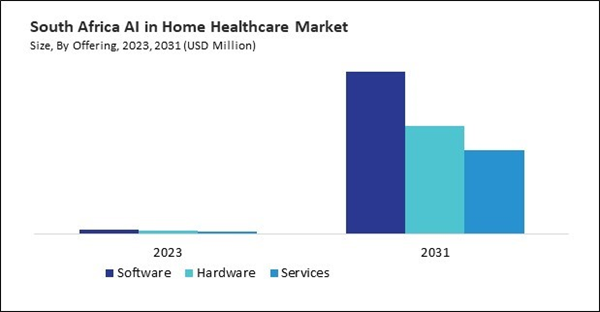The Brazil market dominated the LAMEA AI in Home Healthcare Market by Country in 2023, and would continue to be a dominant market till 2031; thereby, achieving a market value of $676.9 million by 2031. The Argentina market is showcasing a CAGR of 58.1% during (2024 - 2031). Additionally, The UAE market would register a CAGR of 56.8% during (2024 - 2031).
AI algorithms leverage patient data, including genetic information, biomarkers, and behavioral patterns, to tailor personalized care pathways and treatment plans. AI-driven solutions optimize clinical outcomes and enhance patient satisfaction by considering individual preferences, risk factors, and treatment responses.
Furthermore, AI-powered predictive analytics models forecast disease progression, identify high-risk patients, and prioritize interventions to prevent adverse health events. By leveraging machine learning algorithms to analyze historical data and identify patterns, healthcare providers can intervene proactively and mitigate potential complications, reducing hospital readmissions and healthcare costs. Predictive analytics models prioritize identifying high-risk patients more susceptible to adverse health outcomes or complications. By stratifying patients based on risk profiles, AI algorithms enable healthcare providers to target interventions and resources more effectively, focusing on individuals who benefit from proactive care management and preventive interventions.
The growing aging population in South Africa is expected to fuel the demand for AI in home healthcare, as it offers innovative solutions to address the healthcare needs of elderly individuals while improving accessibility, efficiency, and quality of care. As per the data from the Government of South Africa, in 2022, the estimated population of South Africa included more than five million people aged 60 or older. This represents a 9.2 percent share of the overall South African population. Thus, the rising aging population and chronic disease cases in LAMEA are expected to drive the growth of the regional market.
Based on Offering, the market is segmented into Software (Application Programming Interface and Machine Learning Framework), Hardware and Services. Based on Technology, the market is segmented into Machine Learning, Natural Language Processing, Context-aware Computing, and Computer Vision. Based on Application, the market is segmented into Lifestyle Management & Remote Patient Monitoring, Patient Data & Risk Analysis, Virtual Assistants, Wearables, Mental Health and Others. Based on End User, the market is segmented into Healthcare Providers, Healthcare Payers, Patients, and Others. Based on countries, the market is segmented into Brazil, Argentina, UAE, Saudi Arabia, South Africa, Nigeria, and Rest of LAMEA.
List of Key Companies Profiled
- Siemens Healthineers AG (Siemens AG)
- F.Hoffmann-La Roche Ltd.
- GE HealthCare Technologies, Inc.
- Oracle Corporation (Cerner Corporation)
- Koninklijke Philips N.V
- Merative L.P. (Francisco Partners)
- Medtronic PLC
- Sensely, Inc.
- CarePredict Inc.
- Qventus Inc.
Market Report Segmentation
By Offering- Software
- Application Programming Interface
- Machine Learning Framework
- Hardware
- Services
- Machine Learning
- Natural Language Processing
- Context-aware Computing
- Computer Vision
- Lifestyle Management & Remote Patient Monitoring
- Patient Data & Risk Analysis
- Virtual Assistants
- Wearables
- Mental Health
- Others
- Healthcare Providers
- Healthcare Payers
- Patients
- Others
- Brazil
- Argentina
- UAE
- Saudi Arabia
- South Africa
- Nigeria
- Rest of LAMEA
Table of Contents
Companies Mentioned
- Siemens Healthineers AG (Siemens AG)
- F. Hoffmann-La Roche Ltd.
- GE HealthCare Technologies, Inc.
- Oracle Corporation (Cerner Corporation)
- Koninklijke Philips N.V
- Merative L.P. (Francisco Partners)
- Medtronic PLC
- Sensely, Inc.
- CarePredict Inc.
- Qventus Inc.









